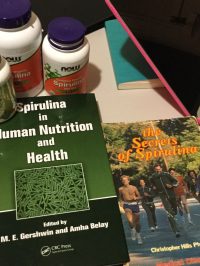Spirulina is nutraceutical algae, and it can help to control asthma. Spirulina and asthma are essential topics. Spirulina can reduce the need for drugs for treatment. Does it sound like a fairy tale? I knew that Spirulina is capable of nourishing bodies with vital nutrients. It seems that Spirulina is a valuable nutraceutical supplement.
Nutraceutical: What it Means?
Nutraceutical: What does it mean?
Nutraceutical means that food or part of a diet can provide us with health benefits and therapeutic value. In the USA, organizations that regulate how to name one or other stuff do not recognize the benefits of essential items such as Spirulina, Noni, or Cordyceps. These mentioned products contain 100% active ingredients. Each of them has the ability to help human beings in one way or another.
I mentioned these products as an example. There are plenty of gifts from nature. People used them to add to their daily intake or help themselves when the body required outside improvement.
Spirulina and Asthma
Asthma is a condition in which the lungs and bronchial airways are affected. People can not breathe easily. Airways are obstructed, and spasms occur.
In the book Spirulina in Human Nutrition and Health authors state
Spirulina with its galaxy of antioxidant nutrients can thus be an effective therapeutic mode for combating detrimental damage and inflammation in the respiratory lining.
Researchers Uliyar V.Mani, Uma M.Iyer, Swati A.Dhruv, Indirani U.Mani, and Kavita S. Sharma wrote that Spirulina is an excellent option for asthma patients. It is a rich source of GLA and antioxidants.
GLA is gamma-linolenic acid. GLA is a fatty acid. In general, fatty acids serve as fuel for the contraction of muscles and body metabolism. GLA in Spirulina acts as the anti-inflammatory representative.

Researchers found out that the antioxidant properties of Spirulina help fight against harmful oxidants. I think that you know that people who smoke or work in contaminated places are prone to conditions such as asthma.
Spirulina is a source of antioxidants
Spirulina is a golden trunk full of nutrients such as beta-carotene, vitamin E, selenium, and other minerals. In the book, Spirulina in Human Nutrition and Health, researchers provide results regarding Spirulina’s influence on patients with asthma.
It is a piece of high-quality evidence from scientists and doctors who spent their time researching Spirulina. In my mentioned book, there are plenty of medical terms and documented results about the benefits of Spirulina.
For example, in the studies, researchers found that IgE ( immunoglobulin E) decreased significantly after the usage of Spirulina.
IgE or immunoglobulin E is the antibody produced by the immune system. These antibodies can trigger allergic reactions by releasing chemicals. When people smoke or receive contaminants through the airways, the immune system reacts to intruders. Allergy or asthma occurs.

Everybody who would like to check the book for themselves can find information about Spirulina and asthma in the book edited by M.E. Gershwin and Amha Belay. Spirulina in Human Nutrition and Health, 83.
The conclusion in the words of scientists
Thus, from the positive results obtained in protein status, pulmonary function, and IgE status in supplemented groups it can be concluded that Spirulina can be introduced along with medicine as a therapeutic and dietary supplement in the treatment of asthmatics, and in the long run this may not only control asthma but also reduce the need of drugs in its treatment.
I do think that it is excellent news because Spirulina does not have side effects. It is a pure and abundant source of antioxidants, nutrients, minerals, vitamins, and proteins. The information about Spirulina and asthma could give insights to people who want to learn more about this particular topic.